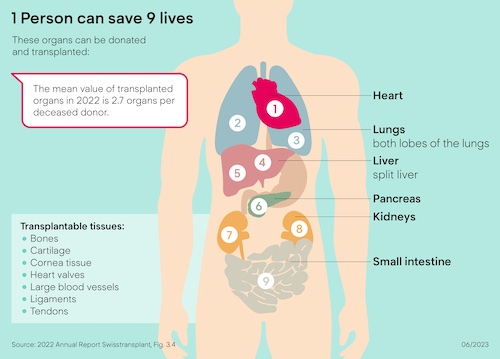
1 person can save 9 lives : Source 2022 Annual Report SwissTransplant, Fig 3.4
Organ donation in brief
Whether you are for or against organ donation, the important thing is that you make a decision. This decision provides security and clarity, and relieves your loved ones in an emergency.
In Switzerland, it is possible to donate up to six organs: heart, lung, liver, kidneys, pancreas, and small intestine. The pancreas can be transplanted in its entirety or as a cluster of isolated pancreatic islet cells (e.g. insulin-producing cells). Transplantable tissues and cells include corneas, heart valves and large blood vessels, bones, cartilage, tendons, and ligaments.
Organ and tissue donation is only possible if the deceased has given his or her consent and the donor's brain death has been established with certainty. Organ harvesting leaves only a scar from the operation, allowing loved ones to bid farewell to the deceased with dignity and serenity.
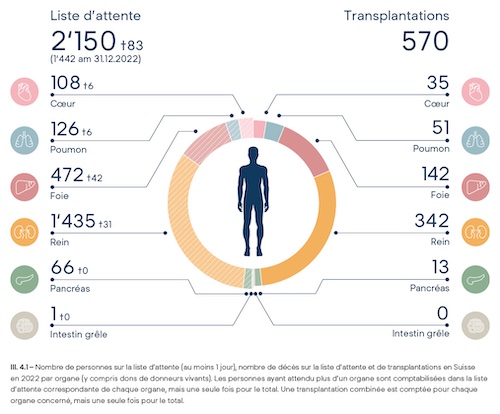
Quarterly figures
Key figures on organ donation and transplantation activity in Switzerland by quarter. The data covers the quarters of the corresponding year, as well as trends over the last five years.
Q2 2023 indicators: highlights in brief
-
- 59 deceased people donated their organs in the second quarter of 2023. This is 18 more people than in the first quarter of 2023. Of the 59 deceased, 27 were brain-dead following cardiovascular arrest (46%). In the last 12 months, 182 deceased people have donated their organs.
- In the second quarter of 2023, 172 organs from deceased donors were transplanted. This represents 53 more organs than in the first quarter of 2023. The number of organs transplanted per deceased donor was also slightly higher (2.9) than in the previous quarter.
- A total of 1,388 patients were waiting for at least one organ at the end of the second quarter of 2023. This is 59 fewer than at the end of the first quarter of 2023.
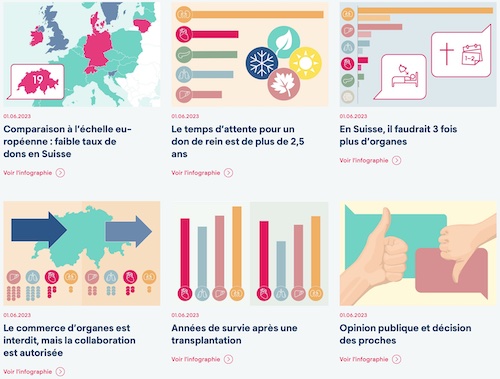
How is death established?
DBD
Donors after brain death (DBD) are post-mortem donors whose brains have lost all blood supply and activity. The main causes of brain death are cerebral hemorrhage, lack of oxygen or severe craniocerebral trauma.
Brain death is the irreversible loss of all cerebral functions (both cerebral hemispheres and brain stem). In accordance with the guidelines of the Swiss Academy of Medical Sciences (SAMS), brain death must be diagnosed by two specialized physicians who are not members of the transplant team (cf. guidelines "Diagnosis of death in the context of organ transplantation", SAMS).
DCD
Donor after Cardio-Circulatory-Death (DCD) includes donors whose vital prognosis is hopeless, and for whom a therapeutic change has been decided in the intensive care unit with a view to initiating the organ procurement process (cf. "Guidelines of the Federation of Swiss Physicians", FMH). The question of organ donation may arise in the case of patients who do not meet the exclusion criteria, and who are likely to suffer a cardiocirculatory arrest within two hours of discontinuation of care.
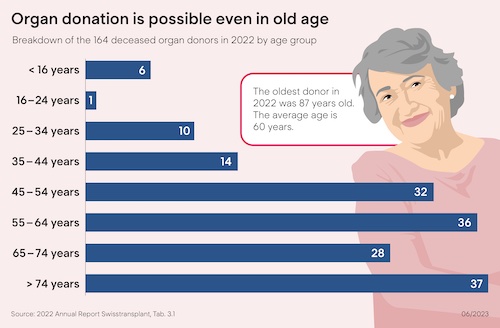
Organ donation is possible even in old age : Source 2022 Annual Report SwissTransplant, Fig 3.1
How are organs allocated?
The allocation of an organ from a donor to a recipient is carried out in strict compliance with the Ordinance on the Allocation of Organs, which is based on the law on transplantation.
The waiting list is essentially drawn up according to the following criteria:
- Medical urgency
- Medical necessity
- Specific priorities (children, rare blood types, etc.)
- Waiting time

European comparison: low donatino rate in Switzerland. Source: EDQM2021
Presentations
How are organ donation and transplant medicine organized in Switzerland? How does organ donation work, and what conditions must be met? Swisstransplant informs interested groups about organ donation and transplantation free of charge. Presentations can be tailored to suit audiences with or without prior knowledge. They are suitable for schools and universities, as well as for association events and information evenings organized by federations and other organizations.
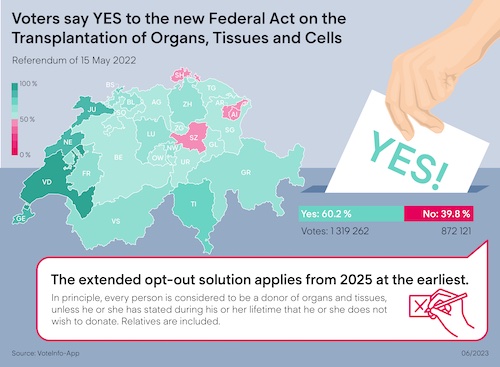
Voters say YES to the new Federal Act on the Transplantation of Organs, Tissues and Cells. Source: Voteinfo-App
The Referendum of 15 May 2022
Switzerland will adopt a system of presumed consent. Up till now, you would hold a donor card stating an explicit consent in your wallet. This means that unless you make your opposition to organ donation clear during your lifetime, you will be considered a potential donor by default.






